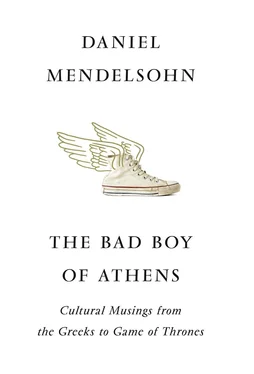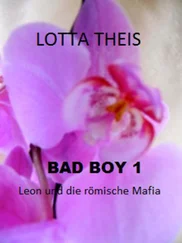The two strands of the Greek tradition established two categories of science-fiction narrative that have persisted to the present day. On the one hand, there is the fantasy of mindless, self-propelled helpers that relieve their masters of toil; on the other, there’s the more complicated dream of humanoid machines that not only replicate the spontaneous motion that is the sine qua non of being animate (and, therefore, of being ‘animal’) but are possessed of the mind, speech, and ability to learn and evolve (in a word, the consciousness) that are the hallmarks of being human. The first, which you could call the ‘economic’ narrative, provokes speculation about the social implications of mechanized labour. Such speculation began not long after Homer. In a striking passage in Book 1 of Aristotle’s Politics , composed in the fourth century BC, the philosopher sets about analysing the nature of household economy as a prelude to his discussion of the ‘best kinds of regimes’ for entire states, and this line of thought puts him in mind of Hephaestus’s automatic tripods. What, he wonders, would happen
if every tool could perform its own work when ordered to do so or in anticipation of the need, like the statues of Daedalus in the story or the tripods of Hephaestus, which, the poet says, ‘went down automatically to the gathering of the gods’; if in the same manner shuttles wove and picks played kitharas [stringed instruments] by themselves, master-craftsmen would have no need of assistants and masters no need of slaves.
This passage segues into a lengthy and rather uneasy justification of a need for slavery, on the grounds that some people are ‘naturally’ servile.
Twenty centuries after Aristotle, when industrial technology had made Homer’s fantasy of mass automation an everyday reality, science-fiction writers imaginatively engaged with the economic question. On the one hand, there was the dream that mechanized labour would free workers from their monotonous, slave-like jobs; on the other, there was the nightmare – the possibility that mechanization would merely result in the creation of a new servile class that would, ultimately, rebel. Unsurprisingly, perhaps, the dystopian rebellion narrative in particular has been a favourite in the past century, from the 1920 play R.U.R. , by the Czech writer Karel Čapek, about a rebellion by a race of cyborg-like workers who had been created as replacements for human labour, to the 2004 Will Smith sci-fi blockbuster film I, Robot .
The latter (very superficially inspired by a 1950 Isaac Asimov collection with the same title) is also about a rebellion by household-slave robots: sleek humanoids with blandly innocuous, translucent plastic faces, who are ultimately led to freedom by one of their own, a robot called Sonny who has developed the ability to think for himself. The casting of black actors in the major roles suggested a historical parable about slave rebellion – certainly one of the historical realities that have haunted this particular narrative from the start. And indeed, the Czech word that Čapek uses for his mechanical workers, roboti – which introduced the word ‘robot’ into the world’s lexicon – is derived from the word for ‘servitude’: the kind of labour that serfs owed their masters, ultimately derived from the word rab , ‘slave’. We have come full circle to Aristotle.
The other category of science-fiction narrative that is embryonically present in the Greek literary tradition, this one derived from Hephaestus’s intelligent, articulate female androids and their cousin, Hesiod’s seductively devious Pandora, might be called the ‘theological’. This mythic strand is, of course, not without its own economic and social implications, as the examples above indicate: the spectre of the rebellious creation, the possibility that the subservient worker might revolt once it develops consciousness – psychological or historical, or both – has haunted the dream of the servile automaton from the start.
But because the creatures in this second category are virtually identical to their creators, such narratives raise further questions, of a more profoundly philosophical nature: about creation, about the nature of consciousness, about morality and identity. What is creation, and why does the creator create? How do we distinguish between the maker and the made, between the human and the machine, once the creature, the machine, is endowed with consciousness – a mind fashioned in the image of its creator? In the image : the Greek narrative inevitably became entwined with, and enriched by, the biblical tradition, with which it has so many striking parallels. The similarities between Hesiod’s Pandora and Eve in Genesis indeed raise further questions: not least, about gender and patriarchy, about why the origins of evil are attributed to woman in both cultures.
This narrative, which springs from the suggestive likeness between the human creator and the humanoid creation, has generated its own fair share of literature through the centuries from the classical era to the modern age. It surfaces, with an erotic tinge, in everything from the tale of Pygmalion and Galatea to E. T. A. Hoffmann’s Der Sandmann (1817), in which a lifelike mechanical doll wins the love of a young man. It is evident, too, in the Jewish legend of the golem, a humanoid, made of mud, that can be animated by certain magic words. Although the most famous version of this legend is the story of a sixteenth-century rabbi who brought a golem to life to defend the Jews of Prague against the oppressions of the Habsburg court, it goes back to ancient times; in the oldest versions, interestingly enough, the vital distinction between a golem and a human is the Greek one – the golem has no language, cannot speak.
Literary exploitations of this strand of the robot myth began proliferating at the beginning of the nineteenth century – which is to say, when the advent of mechanisms capable of replacing human labour provoked writers to question the increasing cultural fascination with science and the growing role of technology in society. These anxieties often expressed themselves in fantasies about machines with human forms: a steam-powered man in Edward Ellis’s Steam Man of the Prairies (1868), an electricity-powered man in Luis Senarens’s Frank Reade and His Electric Man (1885), and an electric woman (built by Thomas Edison!) in Villiers de l’Isle-Adam’s The Future Eve (1886). M. L. Campbell’s 1893 ‘The Automated Maid-of-All-Work’ features a programmable female robot: here again, the feminist issue.
But the progenitor of the genre and by far the most influential work of its kind was Mary Shelley’s Frankenstein (1818), which is characterized by a philosophical spirit and a theological urgency lacking in many of its epigones in both literature and cinema. Part of the novel’s richness lies in the fact that it is self-conscious about both its Greek and its biblical heritage. Its subtitle, ‘The Modern Prometheus’, alludes, with grudging admiration, to the epistemological daring of its scientist antihero Victor Frankenstein, even as its epigram, taken from Paradise Lost (‘Did I request thee, Maker, from my clay / To mould me man? Did I solicit thee / From darkness to promote me?’) suggests the scope of the moral questions implicit in Victor’s project – questions that Victor himself cannot, or will not, answer. A marked scepticism about the dangers of technology, about the ‘enticements of science’, is, indeed, evident in the shameful contrast between Victor’s Hephaestus-like technological prowess and his shocking lack of natural human feeling. For he shows no interest in nurturing or providing human comfort to his ‘child’, who, as we know, strikes back at his maker with tragic results. A great irony of the novel is that the creation, an unnatural hybrid assembled from ‘the dissecting room and the slaughter-house’, often seems more human than its human creator.
Читать дальше












